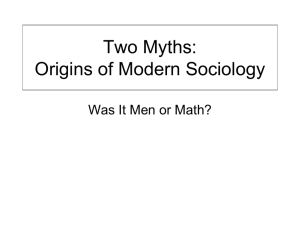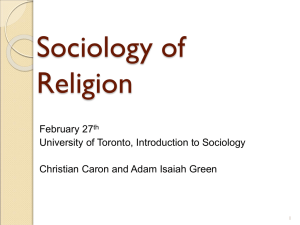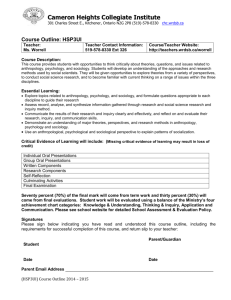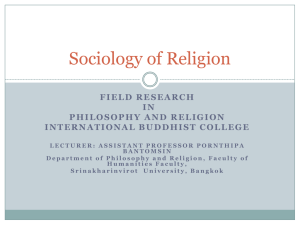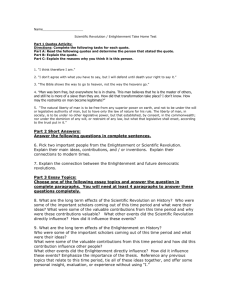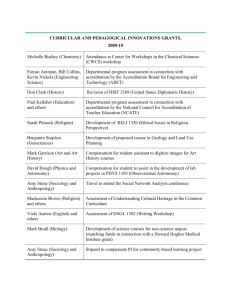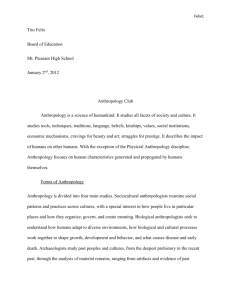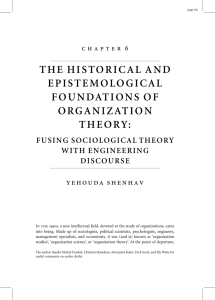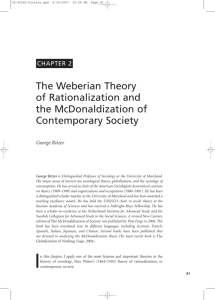Week 2, Fall 2009 - Auburn University
advertisement
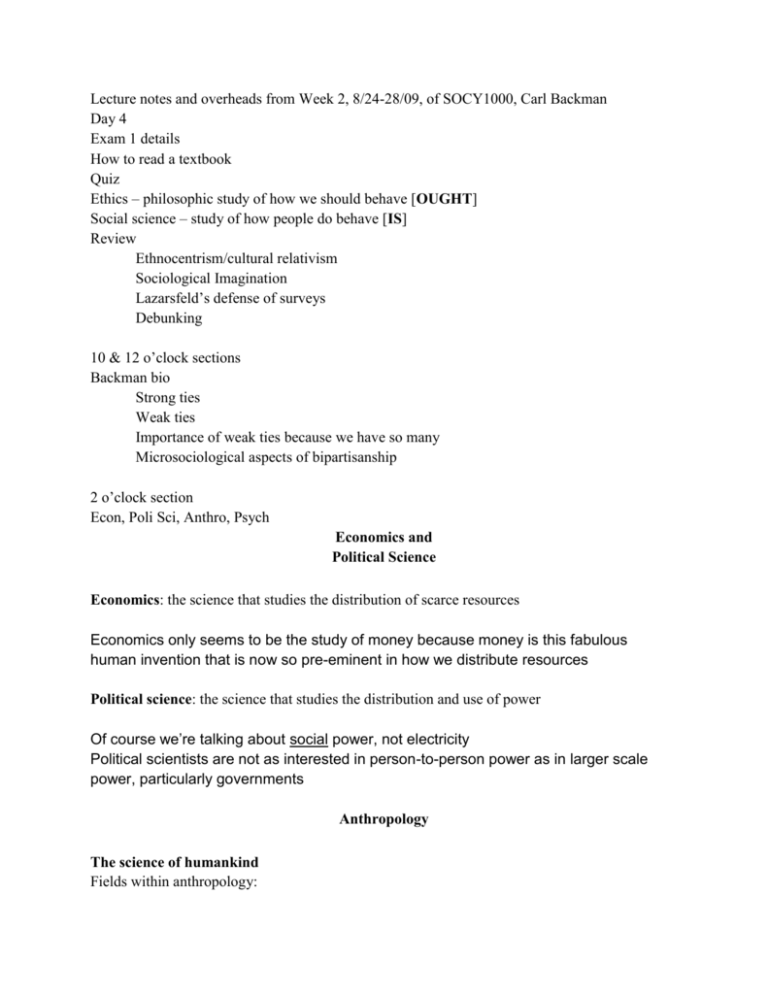
Lecture notes and overheads from Week 2, 8/24-28/09, of SOCY1000, Carl Backman Day 4 Exam 1 details How to read a textbook Quiz Ethics – philosophic study of how we should behave [OUGHT] Social science – study of how people do behave [IS] Review Ethnocentrism/cultural relativism Sociological Imagination Lazarsfeld’s defense of surveys Debunking 10 & 12 o’clock sections Backman bio Strong ties Weak ties Importance of weak ties because we have so many Microsociological aspects of bipartisanship 2 o’clock section Econ, Poli Sci, Anthro, Psych Economics and Political Science Economics: the science that studies the distribution of scarce resources Economics only seems to be the study of money because money is this fabulous human invention that is now so pre-eminent in how we distribute resources Political science: the science that studies the distribution and use of power Of course we’re talking about social power, not electricity Political scientists are not as interested in person-to-person power as in larger scale power, particularly governments Anthropology The science of humankind Fields within anthropology: ● ● ● ● Physical Anthropology Study of the structure and evolution of the human body Cultural Anthropology (aka Social Anthropology) Study of human societies and social organization Linguistics Study of language, languages, and language groups Archeology (aka Archaeology) Study of human societies on the basis of the physical residues they leave behind Cultural Anthropology and Sociology ● ● ● Anthropology tends to be more holistic Sociologists tend to be more willing to look at a small part of society; anthropologists want to see how it all hangs together Anthropologists tend to study smaller groups It is difficult to get a holistic view of large complex societies like the United States Anthropologists are less likely to generalize from an N of 1 Sociologists tend to know a lot about one society; anthropologists know about many societies Branches of Psychology PSYCHOLOGY : the science of the mind ● ● ● ● ● BIOPSYCHOLOGY -- biological processes affecting the mind LEARNING / COGNITION -- learning and thinking PERSONALITY and SOCIAL PSYCHOLOGY -- effects of society on the individual; group process DEVELOPMENTAL PSYCHOLOGY – psychological changes throughout the life span CLINICAL PSYCHOLOGY – mental illness and its treatment Backman biography Ascribed characteristics – characteristics over which the individual has no control Achieved characteristics – characteristics over which the individual has at least some control Societies can differ on which characteristics are achieved and which ascribed Day 5 8/26/09 Reminders: Exam 1 Processing of quizzes On the death of Senator Kennedy: a first hand sociological observation Principle: effective subordinates make effective bosses Kennedy was not afraid of his staff; he encouraged them 10 & 12 sections Review of previous Strength of strong and weak ties in job searches in the US Backman jobs SOCY1000 as an adult course Jobs are: 1. Our entrée to the adult world 2. Our entrée to people we might otherwise not have contact with a. Sometimes the poor (co-workers, clients/customers) b. Sometimes the well off (bosses) Do sociology on your jobs! Origin myth I (see notes below) 2pm section Review Anthro, psych Bio: Ascribed/achieved Abbreviated bio Backman jobs (see above) Origin myth (see notes below) ---------------------------------------------------Origin myth 1 I. Three "founders" of modern sociology A. Karl Marx 1818 - 1883 B. Emile Durkheim 1859 - 1917 C. Max Weber 1864 - 1920 II. Stimuli for development of sociology A. Dramatic changes in 19th century Changes begged to be explained, perhaps even helped along Though we remember the big three in this class for their scientific contributions, each worked to make important practical contributions 1. Consequences of the French Revolution (1789-99) a. "Death knell" of the Ancien Regime (1). Many advantages of the nobility were stripped away (they were taxed!) (2). Power of the Catholic church was drastically reduced; priests became employees of the state, not the church (3). Eventually even the monarchy was abolished and the first republic established (4). Death was protracted; not really complete until WWI (a). Illustrated a principle of social movements: strong social movements tend to generate countermovements (1.1) Because movements are trying to change things, but some people are benefiting from the status quo and hence have interests in resisting and resources to do so (b.) France is now on the Fifth Republic (2). Napoleon overthrew revolutionary govt, eventually restructured much of Europe b. For intellectuals, uneasy end to the breezy optimism of the Enlightenment [see Enlightenment overheads] (1). The Law of Progress: every day, in every way things are getting better because we are getting smarter (a). In France it seemed that every day things were getting snarfed up (2). The guillotines and worse of the First Republic were hardly enlightened 2. Urbanization a. "Traditional" feudal society was rural; people were leaving the countryside and going urban (1). Frederick Toennies: Gemeinschaft vs Gesellschaft 3. Rise of capitalism a. Industrial Revolution (1750ff) changed economies (1). May not have had to be capitalist, but it was b. Industrial Revolution was largely responsible for urbanization c. Capitalism's rise preceded the 19th century, but it took over then B. Institutionalization of science and modernization of universities 1. Newton in physics, Darwin and others in biology inspired some to think science could be applied to social life a. Term "sociology" introduced by Auguste Comte, an instructor in mathematics at France's premiere engineering school. He thought sociology would be the Queen of the Sciences, building on physics and biology 2. Creating a field called "sociology" and finding it a home in universities meant people could make a living doing it in the academy The Enlightenment _____________________________________________________________ An era in European intellectual history from the Glorious Revolution in England (1688) to the French Revolution (1789) - Not everyone uses these same dates The emphasis was on the powers of human rationality, not just in science, but also in matters of ethics, aesthetics, and social policy There was great belief in the “idea of progress,” the feeling that progress in all things was here and was here to stay The Enlightenment II _____________________________________________________________ With the weakening of traditional governmental forms (monarchies and papacy), the question arose, How should people be governed? - Among many with answers: Locke (1602-1704), Montesquieu (1698-1755), the US Constitution (1787), Rousseau (1712-1778), Jefferson (1743-1826), Condorcet (1743-1794), Paine (1737-1809), Voltaire (1694-1778) - As a group these folks, along with some other Enlightenment thinkers, are often called “the philosophes” (though some people restrict the term to French Enlightenment thinkers) Day 6 8/28/09 Two reasons to encourage superior work by subordinates (suggested by the experience of Sen. Kennedy and supported by sociological research) 1. Good work by subordinates leads to good work by the boss 2. Subordinates whose work is good enough that they can leave for more responsible positions in the organization (or elsewhere) form a network of attachments that can be helpful later on. Review Origin Myth 1 as far as we got. Emphasize the impact of the French Rev Karl Marx (1818-1883) _____________________________________________________________ • Huge impact on the world No doubt the most of any PhD More than most people of any kind At one time, 1 / 3rd of world under governments calling themselves “Marxist” • Great scholar “Biggie” in philosophy, political science, economics, history Had impact without an army, wealth, or political position - His importance today (and those Marxist governments) remind us of the power of ideas We’ve forgotten the other “socialists” of his day Marx Ideas _____________________________________________________________ • A theory of capitalism “Explained” past and present Predicted the future Included discussion of globalization that sounds very current • A theory of revolution Who would rebel, when they would rebel, and why 19th and 20th centuries were centuries of revolution - Particularly colonies shedding “masters” - Ironically, countries that did rebel often were not ones his theory expected (e.g., Russia and China) • Marx did not separate his science from his activism Max Weber and Rationality _____________________________________________________________ Max Weber (Mocks VAY-bur) argued that increasing rationality in social life was key to the development of Europe in the centuries after the fall of Rome _____________________________________________________________ Weber’s three forms of rationality 1. Knowledge of how to achieve desired ends 2. Predictability and regularity in complex systems, especially the market and government 3. Active efforts to master or change the world Max Weber & Rationality II _____________________________________________________________ Put another way, Weber argued Europe owed its social and economic structure to 1) cause and effect knowledge, 2) predictable markets and governments, and 3) norms encouraging actors, individual and corporate, to take advantage of knowledge and predictability The results were dramatic: Better life chances Fabulous economic productivity Unprecedented military might Max Weber & Rationality III _____________________________________________________________ Weber argued there are aspects of human behavior that are emotional, not rational Seen in bureaucracies, leadership Bureaucracies: are better ways of organizing large scale efforts than any previous way of organizing minimize individuality among bureaucrats minimize emotional behavior can be “iron cages” in which we accomplish a great deal, but at great emotional cost Max Weber & Rationality IV _____________________________________________________________ Forms of Authority/Leadership/ Followership 1. Traditional leadership: we follow the leader because we always have (e.g., in a hereditary monarchy) 2. Rational-legal leadership: we follow the leader because the rules or the laws tell us to (this is the basis for bureaucracies) 3. Charismatic leadership: we follow the leader because we like the leader and want to please him or her (such authority is non-rational)

